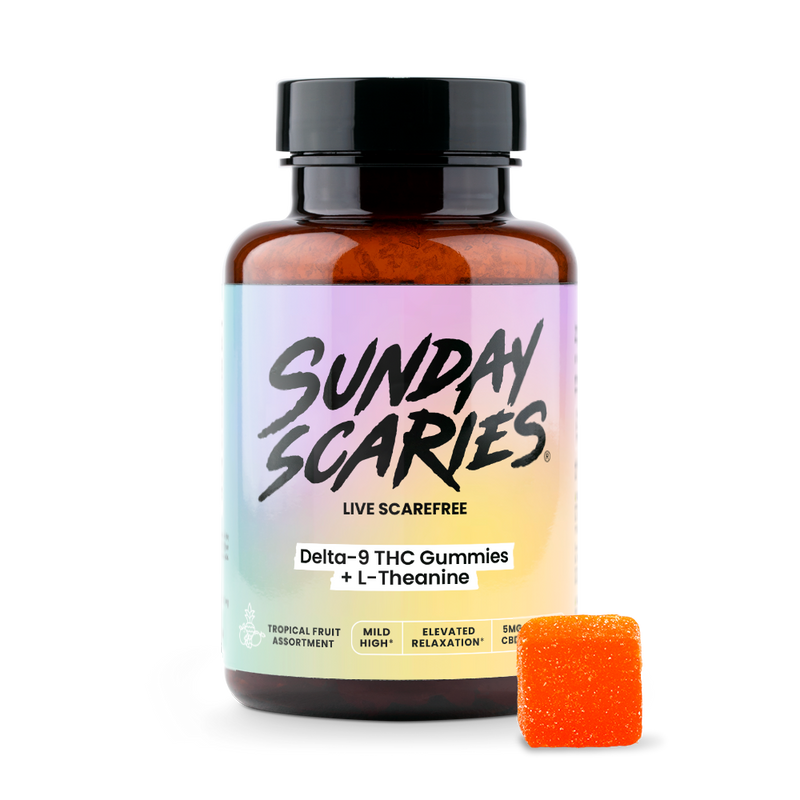
THCA vs. THC: What's The Difference?
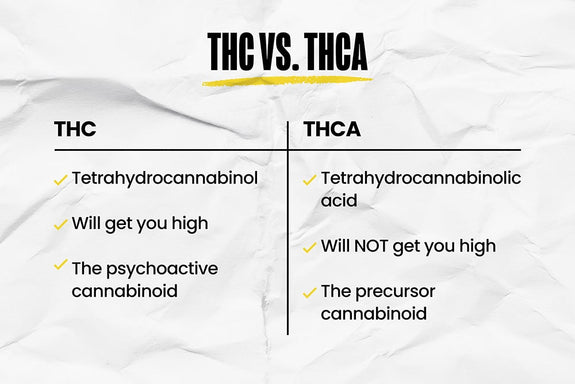
Understanding the distinction between THC and THCA is critical for anyone interested in hemp derivatives or marijuana extracts.
THC is well-known and elicits the high associated with marijuana, while THCA is relatively unknown, is present in unheated cannabis and is non-psychoactive.
This piece dissects the differences, emphasizing the practical implications for usage and legality in the context of THC vs THCA.
Expect to learn about the transformation from THCA to THC with heat and the potential benefits of each compound.
Key Takeaways
- THC is the primary psychoactive compound found in the cannabis plant, responsible for the ‘high’.
- THCA is its non-intoxicating precursor, which converts to THC upon heating through a process called decarboxylation.
- Decarboxylation is essential for activating THC’s psychoactive effects and occurs by heating cannabis, affecting the efficacy of conversion from THCA to THC, with factors like temperature, exposure duration and plant material quantity playing a role.
- THC is being studied for health benefits such as pain relief, appetite stimulation and anxiety relief.
- THCA is being studied for health benefits such as anti-inflammatory properties, neuroprotective effects and as an anti-nausea and anti-emetic compound.
Understanding THCA and THC

THC and THCA, both found in raw cannabis plants, may seem identical at first glance. They’re both cannabinoids, compounds that interact with the body’s endocannabinoid system.
But there’s a key difference: unlike THC, THCA is a non psychoactive cannabinoid, meaning it won’t make you feel “high”.
Their both have a different chemical structure which accounts for this distinction. The cannabis plant produces both THC and THCA, but THCA is the non-intoxicating precursor to THC.
This means that in raw, freshly harvested cannabis, most of the THC exists as THCA.
Only upon heating does THCA convert into THC, the compound responsible for the psychoactive effects of cannabis.
What is THC?
What is THC, exactly? It’s the primary psychoactive constituent of cannabis, responsible for the plant’s intoxicating effects. It stands for Tetrahydrocannabinol.
When you consume THC, it interacts primarily with cannabinoid receptors in the brain, leading to the release of dopamine.
THC’s chemical composition is (-)-(6aR,10aR)-6,6,9-trimethyl-3-pentyl- 6a,7,8,10a-tetrahydro-6H-benzo[c]chromen-1-ol.
It’s produced in the glandular trichomes of the female flowers of the marijuana plant. When you smoke or vape cannabis, the heat decarboxylates the THCA in the plant, converting it into THC.
What is THCA?
THCA serves as the non-psychoactive precursor to THC. THCA stands for Tetrahydrocannabinolic acid.
It undergoes decarboxylation to convert into the psychoactive compound. It’s present in significant quantities in freshly harvested cannabis and only converts to THC when heated, through a process called decarboxylation.
This process involves the transformation of cannabinoid acid, which is abundant in raw cannabis.
THCA’s chemical structure is (6aR,10aR)-1-Hydroxy-6,6,9-trimethyl-3-pentyl-6a,7,8,10a-tetrahydro-6H-benzo[c]chromene-2-carboxylic acid.
This means it has an extra carboxylic acid group, unlike THC. This extra group is what prevents it from binding to cannabinoid receptors in the brain and producing psychoactive effects.
So, in easy distinction, THC is the psychoactive cannabinoid and THCA is the precursor cannabinoid.
Tips for Choosing the Right Cannabis Product
Several factors determine the right cannabis product for you, such as your personal preferences, the effects you desire and the legality of the product in your location. It’s also important to understand the potency of the product, as this can greatly impact the effects.
So, before you make a purchase, take the time to research different products and brands. Look for third-party lab results to verify the levels of THC and THCA in the product. And always start with a small dose to see how your body reacts.
Start low and go slow: 2.5 - 5mg of THC is a great starting point.
Understanding Potency

Understanding the potency of a cannabis product is vital when making your choice. The potency of cannabis products is determined by assessing the concentration of THC and THCA.
This involves a calculation that includes multiplying the percentage of THCA by 0.877, as not all THCA converts to THC when heated.
But remember, just because a product has high levels of THC or THCA, doesn’t necessarily mean it’s better. The right potency for you will depend on your personal tolerance and the desired effects.
THCA vs. THC Percentage
To estimate the THC level in a cannabis product after heating it, you should account for the listed percentages of both THC and THCA. Here's a simplified method to calculate THC content from THCA:
- Identify the THCA Percentage: Check the product's label or lab results for the THCA percentage. Suppose the THCA content is 10%.
- THCA to Milligrams: Convert the THCA percentage into milligrams by multiplying it by 10. For example, 10% THCA equals 100 mg of THCA per gram of cannabis.
- Decarboxylation Adjustment: Not all THCA converts to THC due to decarboxylation efficiency, typically around 87.7% (0.877). Thus, 100 mg THCA becomes 87.7 mg of THC after decarboxylation (100 mg x 0.877).
- Include Existing THC: Add the already present THC content. If THC is 2%, it's 20 mg per gram (2% x 10). Combine this with the converted THC: 87.7 mg + 20 mg = 107.7 mg total THC per gram.
- Total THC Percentage: Convert this total back into a percentage by dividing by 10. So, 107.7 mg per gram is equivalent to 10.77%. The final THC content after combustion is approximately 10.77%.
If you're looking to avoid calculations entirely, consider purchasing legal, delta-9 gummies with an approachable 5mg beginning dose where the THCA is already converted into THC during the confectionary process.
How TCHA is Converted into THC: Decarboxylation

In the cannabis world, decarboxylation plays a vital role. Ad discussed, it’s the chemical reaction that transforms THCA into THC, activating its psychoactive properties.
This transformation happens when cannabis is exposed to heat, such as when it’s smoked, vaped or cooked.
The heat causes a carboxyl group to be removed from the tetrahydrocannabinol molecule, changing its structure and turning it into THC.
The exact temperature and duration required to create THC can vary, but it typically happens around 200-245oF, for about seven minutes.
So, to convert THCA into THC it's as easy as heating it up with a lighter.
The Potential Benefits of THC vs. THCA
THC: Psychoactive and Beneficial
THC, the primary psychoactive component in cannabis, is responsible for the "high" that users experience. It stimulates neurons in the reward system, leading to the release of dopamine. This can potentially cause acute psychosis and dissociative states, producing psychoactive effects.
THC is being studied for its:
- Psychoactive properties
- Euphoria-inducing effects
- Relaxation enhancement
- Altered perception
THCA: Non-Psychoactive and Beneficial
THCA, on the other hand, lacks psychotropic properties and does not elicit intoxicating effects. However, it still holds potential health benefits.
THCA is being studied for its:
- Anti-inflammatory properties
- Neuroprotective properties
- Anti-convulsant effects
- Anti-seizure effects
Both THC and THCA have their unique properties and potential benefits. While THC is recognized for its psychoactive effects and potential therapeutic uses, THCA, despite being non-intoxicating, holds promise as a therapeutic option for neurological conditions.
The Legal Aspects of THC vs. THCA
THC and THCA’s legal status can be complicated. Here is a breakdown of their legal status:
- THC is classified as a Schedule I substance, making it illegal at the federal level in the United States.
- THCA is not classified as a Schedule I substance and is not federally regulated.
- Both THC and THCA cannot be shipped across state lines unless they are hemp-derived and the final product has less than .3% THC by dry weight per the 2018 Farm Bill.
In addition, the legal status of THC and THCA can vary greatly from state to state. Some states have legalized cannabis for medical use, some for recreational use, and some have not legalized it at all.
For a full list of Medical-Use and Non-Medical/Adult-Use check out the constantly updated National Conference of State Legislatures State Cannabis Laws website.
THCA extracts are currently being sold on the market through a legal loophole. Since THCA is a non-psychotropic cannabinoid, is not a Schedule 1 narcotic, and is relatively unregulated, companies are selling THCA products online since the user can easily convert them into THC by lighting them up to smoke.
Do not order these products if you are subjected to drug tests, as other cannabinoids can make you test positive and ensure you check third party lab results from credible brands before doing buying.
Consumption Methods for THC and THCA
There are multiple ways to consume THC and THCA, each having its own pros and cons. These methods include:
- Smoking, Vaporizing and Dabbing
- Edibles and Beverages
- Sublingual Tinctures
- Topicals
Each method differs in its impact and the time it takes for those effects to occur.
1. Smoking, Vaporizing and Dabbing

Two of the most common methods for consuming THC are smoking and vaping. When you smoke or vape cannabis, the heat from the flame or vape device will rapidly convert THCA into THC.
As discussed, unlike the primary cannabinoid THC, THCA is it's raw form is non-psychoactive and does not produce intoxicating effects. Although, consuming THCA can still produce other potential therapeutic benefits.
Vaping may yield more potent effects in comparison to smoking and is regarded as safer due to the reduced production of harmful components from combustion.
Dabbing is another method of vaporization that involves heating a concentrated form of cannabis, such as shatter or wax, and inhaling the vapor. This form of inhaling leads to the most instant and most potent high.
2. Edibles and Beverages

As an alternative to inhaling cannabis flowers, cannabis consumers can consume THC and THCA through edibles and beverages.
The edibles are created by infusing a cooking oil or butter with cannabis, and then using this infused oil to create a range of foods and drinks. This method can make consuming cannabis a more pleasant experience, especially for those who don’t enjoy inhaling.
The beverages are created by infusing THC or THCA into a liquid form, such as juice, soda, or water. These beverages are typically consumed for their psychoactive effects or as a way of consuming cannabis without smoking it.
Some popular types of edibles and beverages include:
- Brownies
- Cookies
- Gummies
- Chocolates
- Cannabis-infused teas
- Marijuana products as beverages for alcohol replacements
But there are some important things to consider when consuming cannabis in this way. For starters, the effects of THC-infused gummies like our THC gummies for sleep can take longer to kick in compared to smoking or vaping.
And because the THC is being digested, when purchasing marijuana products in edible form the effects can also last longer, usually from 4-6 hours.
3. Sublingual Tinctures

Sublingual tinctures present yet another method for consuming THC and THCA. Sublingual, or under-the-tongue, application involves placing a few drops of cannabis tincture under the tongue where it's rapidly absorbed into the bloodstream through the mucous membrane.
This method bypasses the digestive system, allowing for faster onset of effects compared to edibles.
The sublingual method is discreet, easy to control dosage, and the effects are typically felt within 20 to 30 minutes. Because the tincture is absorbed directly into the bloodstream, it doesn't have to go through the liver first, which means you get more of the medicinal effects faster.
Sublingual tinctures are often preferred by those who need fast relief from symptoms like stress or poor sleep. They're also a great option for those who prefer not to smoke or vape.
4. Topicals

Topicals, such as creams and lotions, provide another method for using THC and THCA. These products can be applied directly to the skin, providing localized relief without undergoing the chemical reaction of decarboxylation and inducing psychoactive effects.
Transdermal patches and high THC content lotions can potentially cause intoxicating effects, although this is highly unlikely.
THC/THCA topicals are mostly marketed in the cannabis industry for their therapeutic potential in producing anti-inflammatory effects or body ache relief.
Topicals usually don't have the same potent effects as ingestibles, but they are a great alternative for a user who does not want to consume THC/THCA products.
5. Suppositories

Suppositories are another method of consuming THC and THCA, although not as popular or commonly used. Suppositories are designed to be inserted into the rectum or vagina, where they dissolve and deliver the cannabinoids directly into the bloodstream.
The use of suppositories allows for a more substantial amount of cannabis to enter the bloodstream without being absorbed by the liver first. This results in a stronger and longer-lasting effect than other methods of consumption.
Suppositories are often marketed for medicinal purposes, such as a potential, yet understudied, way to address chronic pain or by providing relief from menstrual cramps.
Summary
In conclusion, while THC (tetrahydrocannabinol) and THCA (tetrahydrocannabinolic acid) are both cannabinoids found in the cannabis plant, they have distinct differences in their psychoactive properties and potential health benefits. The main difference lies in their chemical structure: THC is psychoactive, which means it can make you feel “high”, while THCA is not.
However, when THCA is heated, it converts into THC, activating its psychoactive properties.
Whether you’re seeking the psychoactive effects of THC or the potential health benefits of THCA, it’s important to understand the legal implications, various consumption methods and how to choose the right product for your needs.
Getting educated on these aspects can ensure a safe and enjoyable experience for all cannabis consumers.
Frequently Asked Questions
What is the difference between THC and THCA?
THC and THCA are both cannabinoids found in the cannabis plant. However, THC is psychoactive, which means it can make you feel “high”, while THCA is not. When heated, THCA converts into THC, activating its psychoactive properties.
THCA vs THC which is stronger?
THCA is not as strong as THC. THCA is inactive and does not produce psychoactive effects until it is heated and transformed into THC, making it less potent than THC.
Can THCA cause a high?
No, consuming raw THCA or ingesting gummies made from it will not produce a high, but it may show up in a drug test and lead to a failed test.
What degrees does THCA turn into THC?
Decarbing THCA into THC is best achieved at temperatures between 200-245oF, as this allows the conversion to occur without affecting other cannabinoids and terpenes.
What are the benefits of using THCA?
THCA is currently being studied for providing potential benefits such as anti-inflammatory effects, anti-convulsant effects and anti-seizure effects. Additionally, it is being studied as a neuroprotectant, making it potentially beneficial for conditions such as multiple sclerosis, Alzheimer's, and Parkinson's disease.
It's important to know that research on cannabinoids is in its infancy and more studies need to be performed on the effects of these compounds on the endocannabinoid system in general.
What is decarboxylation?
Decarboxylation is the heating process that transforms THCA into THC, enabling its psychoactive effects.
THCA vs. THCv
THCA (Tetrahydrocannabinolic acid) is a non-psychoactive cannabinoid that converts to the psychoactive THC (Tetrahydrocannabinol) when heated, while THCv (Tetrahydrocannabivarin) is a homologue of THC that potentially offers a variety of effects and medical benefits distinct from THC, including appetite suppression and improved insulin sensitivity.
THCA vs. THCo
While THCA is a non-psychoactive cannabinoid that converts into the psychoactive THC when heated, THCO (tetrahydrocannabinol-o-acetate), also known as THC-O-acetate or ATHC, is a synthetic analog of THC that is believed to be two to three times more potent.
Delta 9 THC vs THCA
Delta 9 THC is a psychoactive cannabinoid known for producing the "high" associated with cannabis, while THCA is a non-psychoactive precursor to THC that converts to THC when heated, offering potential therapeutic benefits without the intoxicating effects.

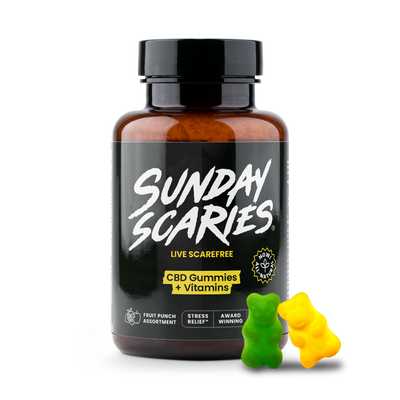 CBD Gummies
Stress Relief
CBD Gummies
Stress Relief
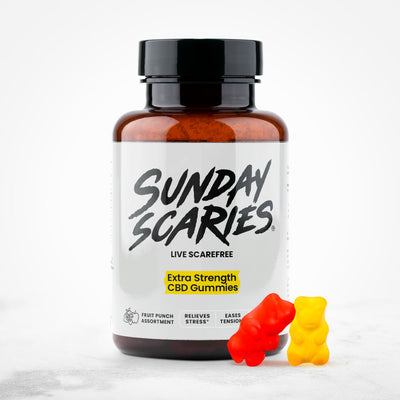 Extra Strength CBD Gummies
Stress Relief
Extra Strength CBD Gummies
Stress Relief
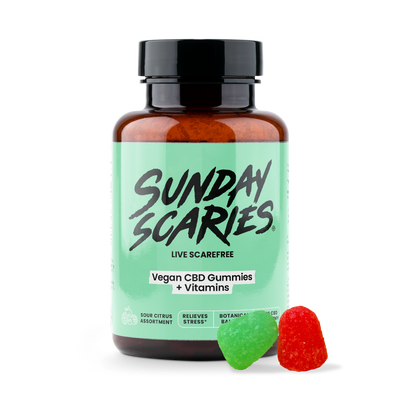 Vegan CBD Gummies
Stress Relief
Vegan CBD Gummies
Stress Relief
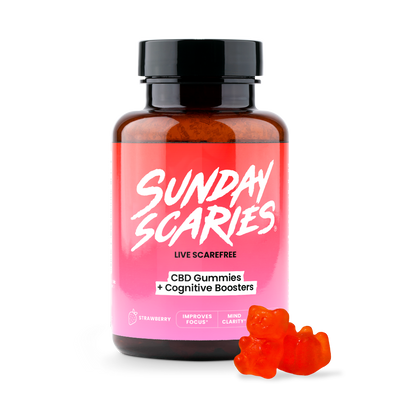 CBD Gummies for Focus
Focus Boost
CBD Gummies for Focus
Focus Boost
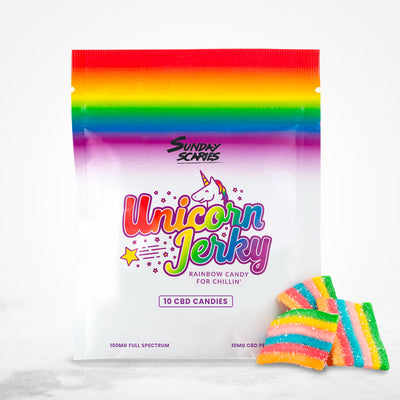 CBD Candy
Mood Lift
CBD Candy
Mood Lift
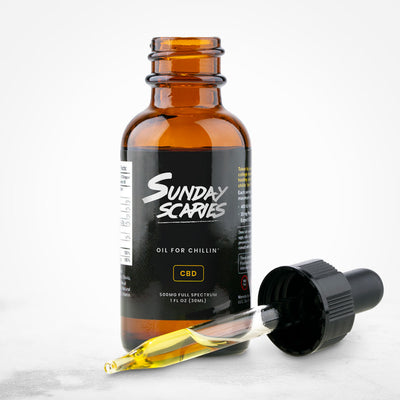 CBD Daytime Oil
Stress Relief
CBD Daytime Oil
Stress Relief
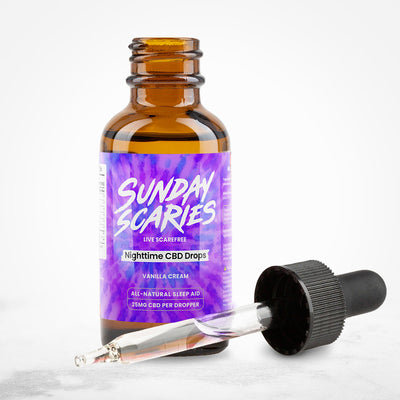 CBD Sleep Oil
Sleep Aid
CBD Sleep Oil
Sleep Aid
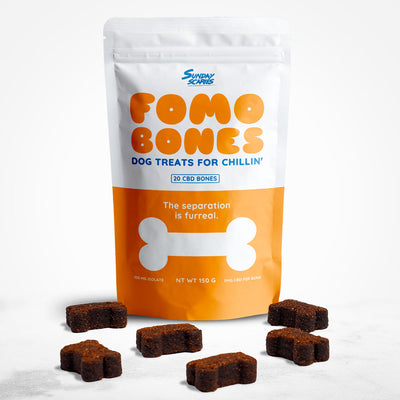 CBD Dog Treats
Stress Relief
CBD Dog Treats
Stress Relief
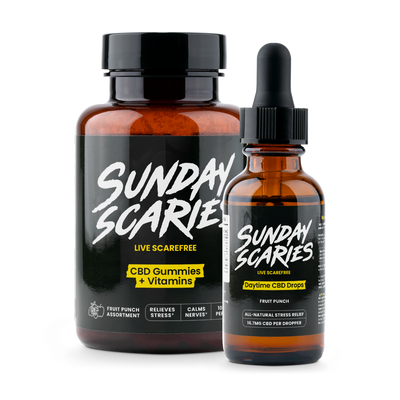 Side Piece Bundle
Stress Relief
Side Piece Bundle
Stress Relief
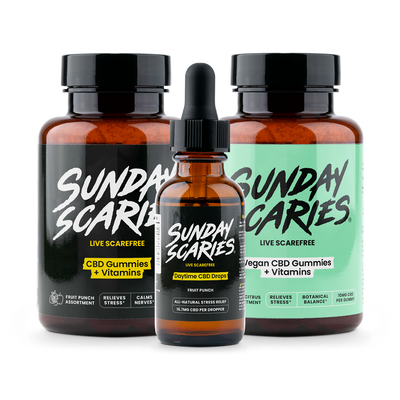 Rando Bundle
Stress Relief
Rando Bundle
Stress Relief
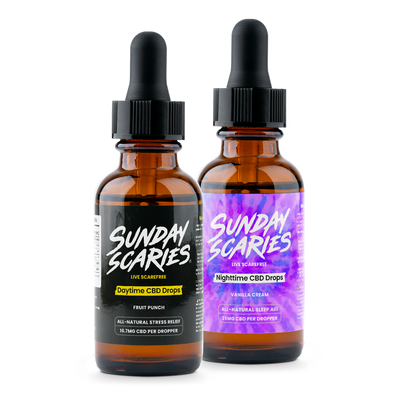 Sunrise & Sunset CBD Oil Bundle
Stress Relief
Sunrise & Sunset CBD Oil Bundle
Stress Relief
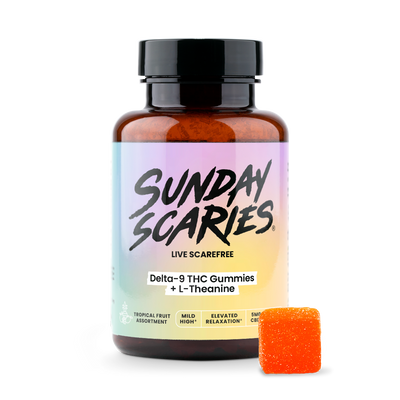 5mg Delta-9 Gummies
Euphoria
5mg Delta-9 Gummies
Euphoria
 10mg Delta-9 Gummies
Euphoria
10mg Delta-9 Gummies
Euphoria
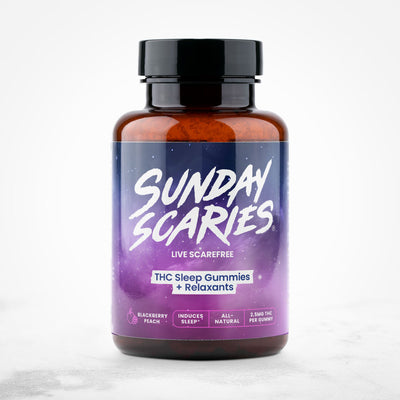 THC Gummies for Sleep
Sleep Aid
THC Gummies for Sleep
Sleep Aid
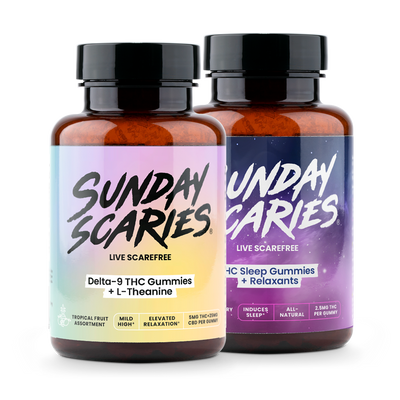 Day & Night THC Gummies Bundle
Stress Relief
Day & Night THC Gummies Bundle
Stress Relief
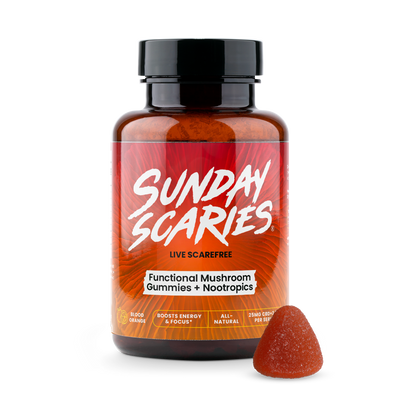 Mushroom Gummies
Focus Boost
Mushroom Gummies
Focus Boost
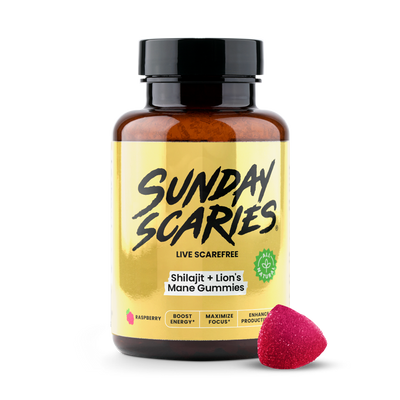 Shilajit Gummies
Focus Boost
Shilajit Gummies
Focus Boost
 Sunday Scaries Hat
Sunday Scaries Hat
 Sunday Scaries Dad Hat
Sunday Scaries Dad Hat
 Sunday Scaries T-Shirt
Sunday Scaries T-Shirt
 Sunday Scaries Pocket Tee
Sunday Scaries Pocket Tee
 Sunday Scaries Tank Top
Sunday Scaries Tank Top
 Sunday Scaries Sweatshirt
Sunday Scaries Sweatshirt
 Sunday Scaries Blanket Jacket
Sunday Scaries Blanket Jacket
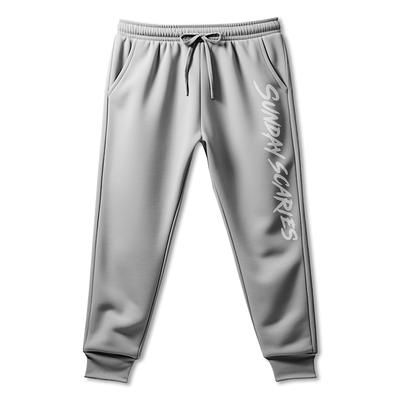 Sunday Scaries Sweatpants
Sunday Scaries Sweatpants

